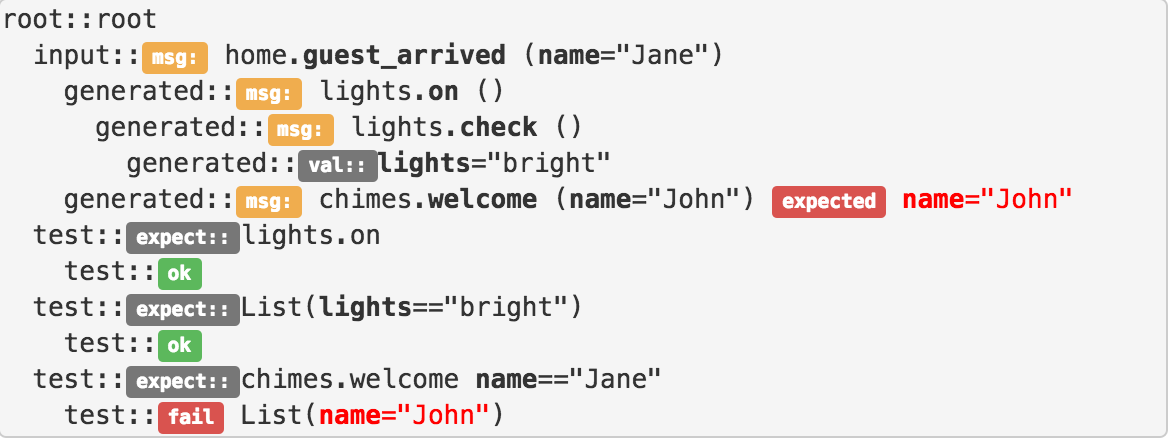Rules, flows, actors and microservices. See:
- Reactive programming fabric
- Language reference
- Expressions and pattern matching
- Towers of Hanoi example: spec and story
A simple reactive, message-oriented workflow framework, driven by rules and layered on top of akka actors. Messages are defined by example, using pattern matching:
$when math.fact (n == 0)
=> (payload=1)
$when math.fact (n > 0)
=> math.fact (n=n-1)
=> (payload=payload * n)This is a generic rules-based engine which can be used in a variety of scenarios, such as just workflow processing, "message broker", "decomposition" or other. Relies on a simple DSL to define rules and an engine to interpret them. The rules DSL has only a few constructs:
$msgto specify the signature of a message, optional$whento create a production rule$mockto create a mock rule
$when home.guest_arrived => lights.on
$when home.guest_arrived(name=="Jane") => chimes.welcome(name)
$mock chimes.welcome(name) => (greeting = "Greetings, "+name)
These messages are bound natively and automatically to REST, resulting in a microservices mocking, prototyping and testing framework, built with simple play framework bindings.
The diesel workflow framework: automatically turns any workflow into a microservice and/or orchestrate any microservices with the workflow rules.
Relies on a DSL to define microservices, rules and test and run these.
$send home.guest_arrived(name="Jane")
$expect lights.on
$expect (light is "bright")
$expect (greeting is "Greetings, Jane")
$expect chimes.welcome(name is "Janexx")
You can embed in your app or use as is. You can run it on-prem or in cloud, at http://www.dieselapps.com - see The simplest micro-service you ever created
The engine uses a tree-like model, which is the "execution trace". This will represent, at all times, the current state of execution (some nodes may be async operations that we're waiting for etc).
The engine uses an "intuitive" sync/async model for processing the "nodes": simple transformation nodes are executed synchronously, while all messages are executed asynchronously.
The intuitive part comes in when executing sequences of nodes - these are also executed sync/async but in sequence, implicitly using the ask pattern and Futures, very much like a sequence of messages processed by the same actor. In fact, each workflow has an associated akka actor which will execute the messages in sequence, but without blocking threads etc.
The engine itself is always async, so you can use this model to quickly wrap synchronous operations as asynchronous processes.
There are special constructs, for when you need to allow truly parallel execution of messages.
You can easily define your own nodes and/or sync/async executors for certain messages.
- scala 2.11
- akka 2.4, with akka-cluster etc
- play framework 2.4
Mock a simple REST API - see The simplest microservice you ever created:
$mock say.hi (name ?= "Jane") => (greeting = "Hello, " + name)
Test the simple REST API - see Simple microservices testing:
$send say.hi (name = "Jane")
$expect (greeting contains "Jane")
implicit val system = ActorSystem("testsystem", ConfigFactory.parseString(""" """))
// tell the engine to use this system
DieselAppContext.setActorSystem(system)
// make a spec
val spec = DieselTextSpec (
"spec_name",
"""
|$when home.guest_arrived => lights.on
|
|$when home.guest_arrived(name=="Jane") => chimes.welcome(name)
|
|$when chimes.welcome => (greeting = "Greetings, "+name)
|""".stripMargin
)
// make a story
val story = DieselTextSpec (
"story_name",
"""
|$send home.guest_arrived(name="Jane")
|""".stripMargin
)
// run it: create engine, run story and wait for result
val engine = DomEngineUtils.execAndWait(
DomEngineUtils.mkEngine(
new DomEngineSettings().copy(realm=Some("rk")),
List(spec),
List(story)
)
)
println(engine.root.toString) // debug trace of engine's execution
println(engine.resultingValue) // resulting value, if any
// test it
assert(engine.resultingValue contains "Greetings, Jane")